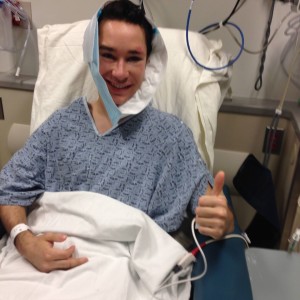Finding ideas in unlikely places
I’m sitting in the Surgical Family waiting room at Boston’s famed Mass General Hospital. People are talking quietly or reading hardcover books. A woman in her 40’s wearing black track pants and white sneakers is slumped across two chairs, snoring. An elderly man sits upright as he naps, his head bobbing down to the collar of his violet dress shirt. Out of the 40 or so people here no one is on a device. There are no televisions or bright lights. We’re all in a quiet waiting womb.
I, and I suspect the others, are feeling vulnerable, unable to concentrate on anything but our loved one. How will the surgery turn out? Will it be easier or more complicated than the doctors’ expected? Will we be able to take our son, daughter, mother, father, wife, husband, sister, best friend home soon or will surprises force a longer hospital stay?
We are all on alert, fully awake and quiet amid the stress of not knowing.
My son was hit by a car two weeks ago while riding his bike back to his dorm in Savannah, Ga. God caught him as he spun from the bike, bounced off the car and kissed the pavement with his beautiful 19 year-old face. He had no concussion, a miracle. The local hospital stitched up the gash on his forehead, put his finger in a splint, and told him to find a plastic surgeon to repair the four broken bones in his face. So here we are.
Driving by the Charles River this morning at 6 a.m. on our way to the hospital my son turned up the volume of his favorite music group, The Head and the Heart (of all names), and mused, “I am so lucky I don’t have brain damage from bouncing off that windshield.”
This mother bear nodded in fierce agreement. Oh, how lucky we are.
But now I am on edge, waiting for the surgeon’s call.
And I am remarkably creative.
Ideas for an education program that I’ve been wrestling with floated out of nowhere an hour ago. It’s like I was taking dictation from some learned person who said, “Here is what people want to learn and what you need to teach them."
“OK, got it. Wait, slow down. I can’t write down all these ideas fast enough.”
I’ve been struggling to figure out how to put this program together for three weeks and then -- BAM! – done in 20 minutes.
What’s going on?
When we get jolted out of our usual routines ideas can say, “Thank you for taking down all those assumption and anxiety barriers. Now we can stroll right into your brain and you can welcome us.”
Sounds crazy. But research shows that when there’s less activity in our brain’s frontal lobes, we’re more likely to come up with an original idea.
According to Dr. Rex Jung of University of New Mexico, inventive brains are less packed and organized and so nerve traffic is slowed down. This gives the opportunity for more unusual connections to be made even if it takes a little while to do so.
Because my brain is much less full than usual as I sit quietly thinking about not much of anything but my son, my brain has been experiencing what Dr. Jung calls “transient hypofrontality.” This frontal lobe change has allowed my brain to make new connections, to think more creatively if you will.
 There are far better ways to experience this calm brain state than sitting in a waiting room. Researchers recommend running, meditating, walking, and other activities that require us to turn off our devices and noisy brain talk and just be quiet.
There are far better ways to experience this calm brain state than sitting in a waiting room. Researchers recommend running, meditating, walking, and other activities that require us to turn off our devices and noisy brain talk and just be quiet.
My brain was so thoughtful delivering a creative gift of a new idea this morning.
The best gift, however, was the call from the surgeon telling me that my son’s procedure was over and was not as complicated as they had expected. Maybe we should play The Head and the Heart’s “Sounds Like Hallelujah” on the ride home.